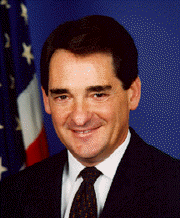
Rep. Billy Tauzin
Death of Anti Slamming Bill Shifts Initiative to the FCC
(October 22, 1998) Negotiations over the anti-slamming bill failed to produce a compromise in the final days of the 105th Congress. However, the FCC has authority under the Telecom Act of 1996 to enact and enforce regulations dealing with the problem of slamming -- the unauthorized switching of long distance phone companies.
| See, Summary of Anti-Slamming Bills. |
The anti-slamming provisions of these bills would have provided additional protections to phone users against the unauthorized changing of their telephone exchange or telephone toll service provider, mainly by increasing the regulatory authority of the FCC in this area.
Congress, and especially the House Commerce Committee and the Senate Commerce Committee, spent considerable time this year holding hearings and drafting language. The Senate passed its anti-slamming bill, S 1618, sponsored by Sen. John McCain (R-AZ) on May 12. The House passed its version of the bill, HR 3888, on October 12. However, there were major differences between the two bills.
The bills differed not only regarding their anti-slamming provisions, but also in the other significant legislative proposals attached to the bills. For example, the Senate bill was passed with two amendments: Sen. Frank Murkowski's (R-AK) anti-spamming bill, and Sen. Jay Rockefeller's (D-WV) "Truth in Advertising" proposal.
 |
|
Rep. Billy Tauzin |
Rep. Billy Tauzin (R-LA), Chairman of the House Telecommunications Subcommittee, and the lead sponsor of the House bill, was active up until the end trying to work out an acceptable compromise bill. The House wrapped up business Tuesday night, and the Senate on Wednesday morning, with passage of the massive Omnibus Appropriations Bill. "We simply ran out of time," said Ken Johnson, spokesman for Rep. Tauzin.
"If not for the last minute interference of several powerful telephone companies, this bill would have been signed into law," said Johnson. "As a result, Billy is prepared to give the FCC the green light to take whatever action is necessary to prevent slamming in the future."
"We hope the FCC drops the hammer hard on offending companies."
Both Rep. Tauzin and Sen.McCain have sparred with the Federal Communications Commission on a number of issues recently. Both have sought to restrain the power of the FCC. "Tauzin and McCain have been longtime critics of the FCC," said Johnson. But, "we gave it our best shot, and we failed." He said that their message to the FCC is, "You have our blessing to do whatever you think is necessary."
Congress gave the FCC authority to enact and enforce regulations to deal with the
problem of slamming in the 1996 Telecommunications Act. However, the FCC has not yet acted
on that mandate.
| The role of the Federal Communications Commission in dealing with slamming was discussed in House hearings. For example, Rep. Stearns (R-FL) said the following at an August 7 markup session of the House Telecommunications Subcommittee: |
|